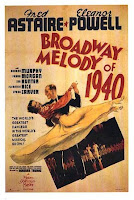-
 Joe Johnston's Captain America, first off, is really a triumph of sweetly-flavored nostalgia and pure WWII newsprint pulp. I can't say that the film particularly works as an action picture (it's too uncommitted and authorless), but from the art direction to Chris Evans' lead performance, it's wholly likable in almost every way.
Joe Johnston's Captain America, first off, is really a triumph of sweetly-flavored nostalgia and pure WWII newsprint pulp. I can't say that the film particularly works as an action picture (it's too uncommitted and authorless), but from the art direction to Chris Evans' lead performance, it's wholly likable in almost every way. -
And I really did enjoy Hugo Weaving's Red Skull (props to the costume, make-up, visual effects departments there) and Tommy Lee Jones' dry, sarcastically humorous Colonel Chester Phillips.
-
Unfortunately, everything becomes quite cluttered and careless once Steve Rogers makes the transformation from scrawny, digitally-wussified asthmatic to bulging superhero. There's one montage too many, a herky-jerky Nazi entanglement and one limp ending - fortunately the film has built up enough goodwill to see it through, albeit narrowly. [B-]
-
Jon Favreau's Cowboys & Aliens meanwhile, while taking a similar trajectory in terms of quality, doesn't just meekly crumble off the screen, it crashes and burns, wasting an assured, imposing performance from Daniel Craig in the process.
-
 Like that deliciously teasing trailer we witnessed on more than one occasion in cinemas, the set-up here - the film's jangly western beginnings - is solid. Unfortunately the promise of otherworldly visitors dropping down on Absolution (or 1873 Arizona) sounds better than it tastes.
Like that deliciously teasing trailer we witnessed on more than one occasion in cinemas, the set-up here - the film's jangly western beginnings - is solid. Unfortunately the promise of otherworldly visitors dropping down on Absolution (or 1873 Arizona) sounds better than it tastes. -
Even a stable of five accredited screenwriters can't put their heads together to wring out a more enticing third-act scenario and thus the film absolutely withers once it crosses the halfway point - into a barren, textbook and ferociously silly action climax, abruptly abandoning any previous notion of self-aware genre exploration. By the credits, you'll regret that the film wasn't simply called Cowboys. [D+]










